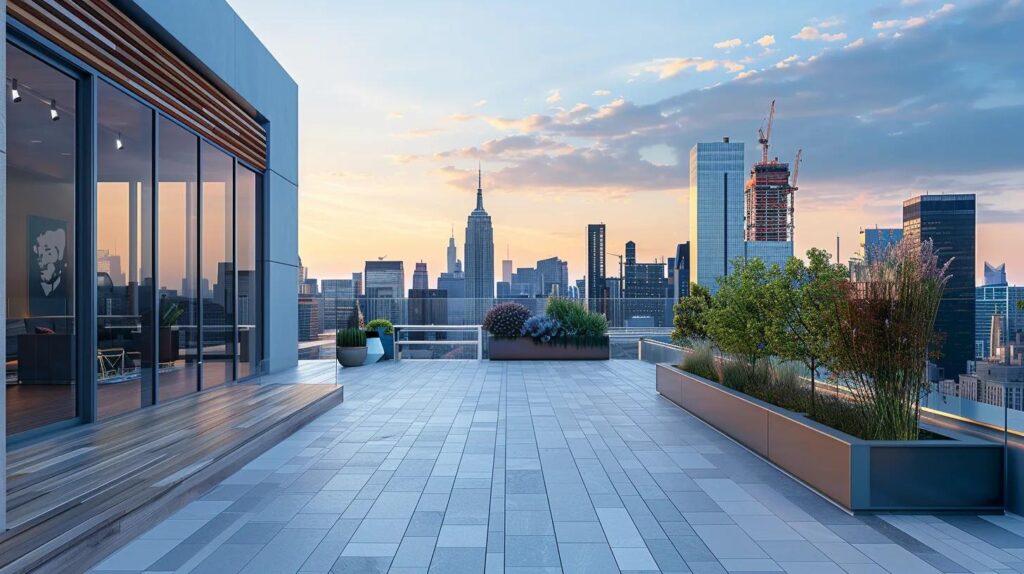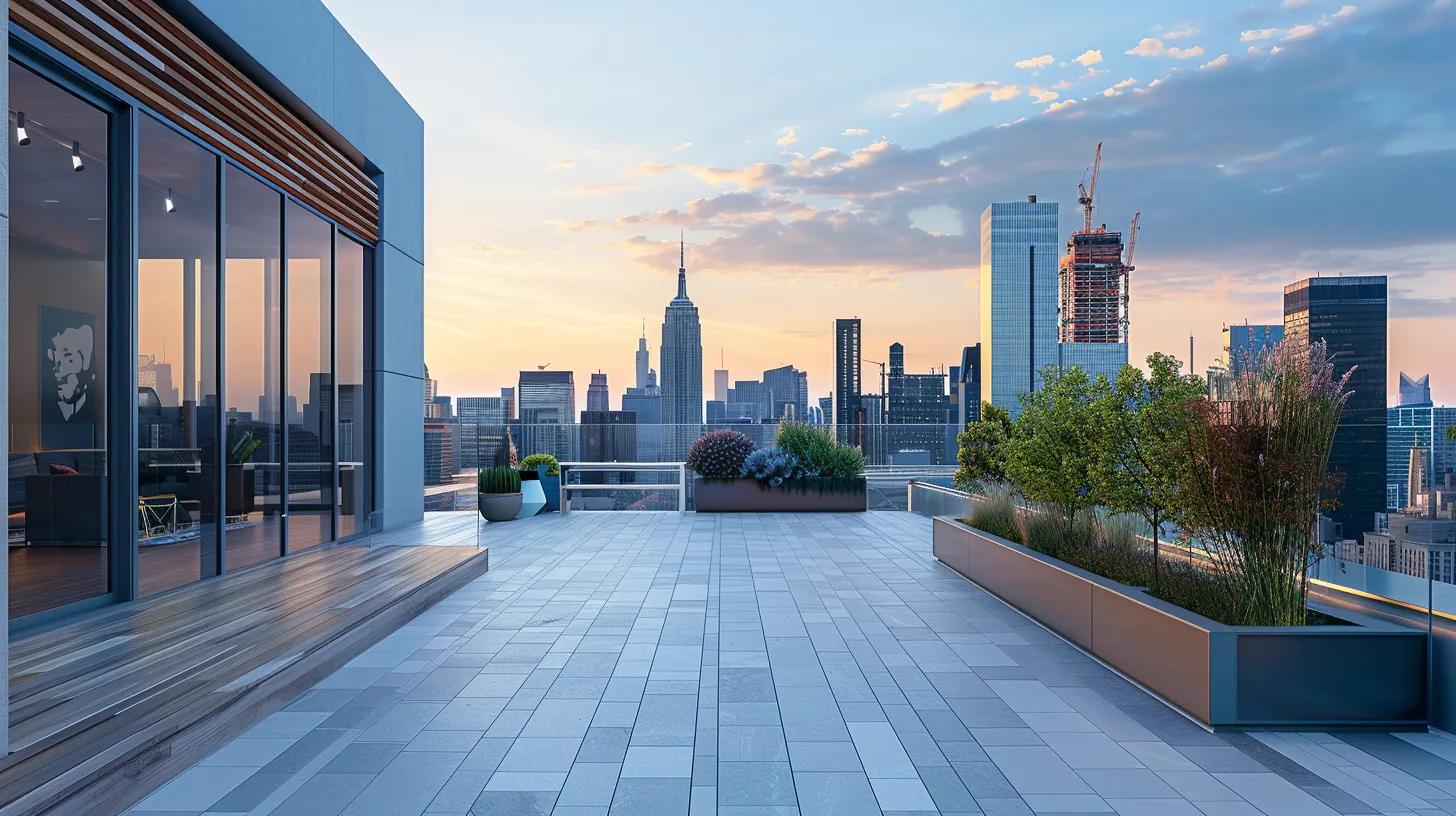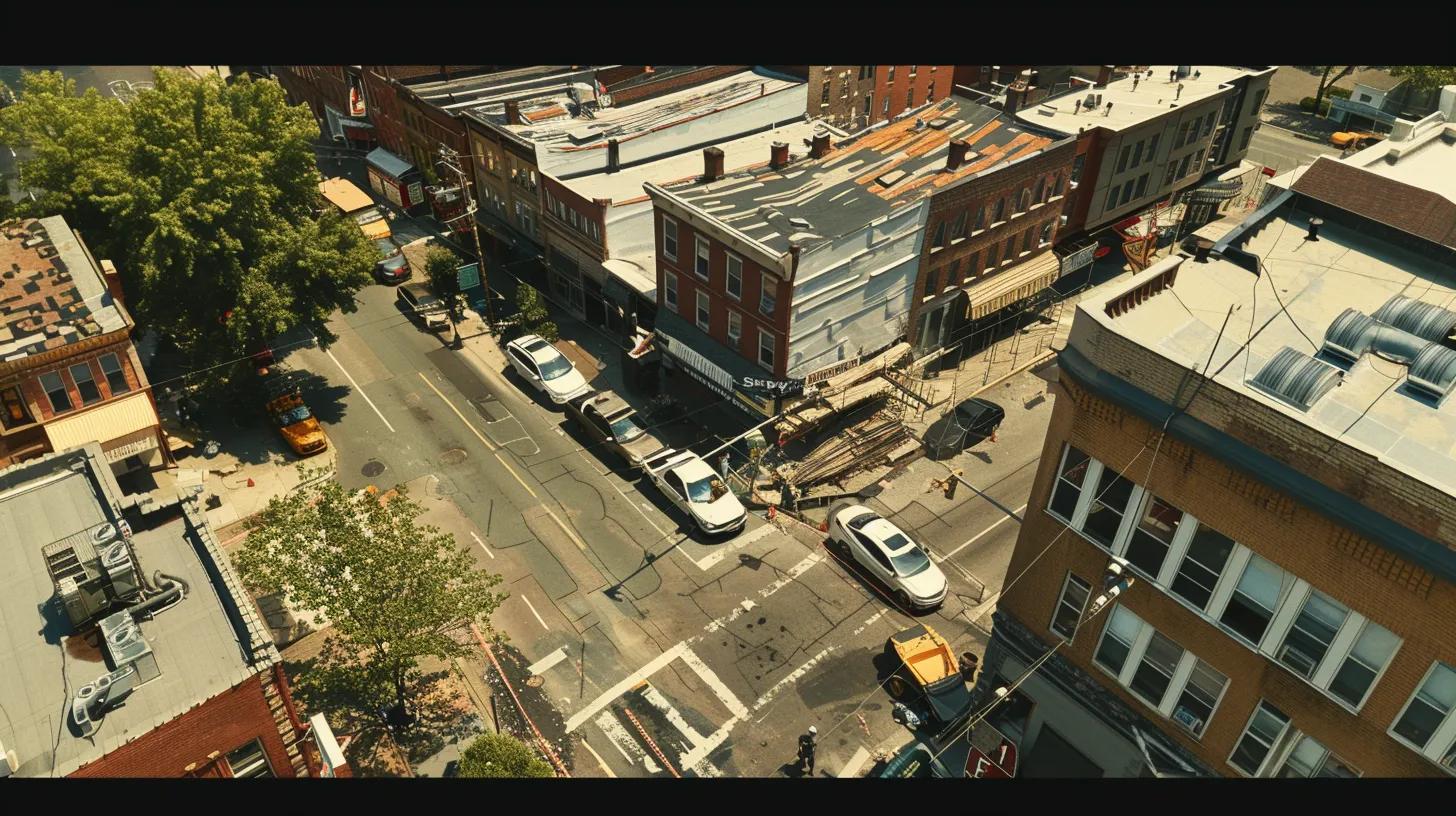Best Roofing Materials for New Jersey Homes
New Jersey homeowners understand the importance of selecting roofing materials that not only complement the architectural style of their houses but also withstand the state’s varied climate conditions. In many cases, consulting with roofing services nj professionals can help determine the best products for these challenges. Homeowners in New Jersey face challenges from snow, rain, wind, and intense sun exposure, making the decision process not just about aesthetics but also long-term performance, energy efficiency, and durability. This article provides a comprehensive evaluation of roofing materials ideal for New Jersey homes. It delves into popular choices such as asphalt shingles, metal roofs, slate, wood shakes, and composite options while addressing key factors like weather resistance, cost-effectiveness, energy efficiency, and environmental sustainability. For those interested in streamlined maintenance, many experts also recommend considering roofing-services options alongside chimney-services to ensure a complete home protection solution. The roofing material you choose can affect your home’s energy consumption, indoor comfort, repair costs, and even curb appeal. With detailed insights, expert recommendations, and data from peer-reviewed research studies, homeowners will receive complete information to make an informed decision.
This detailed guide will explore various roofing materials and specialized options, including roofing services nj and roofing-services, tailored to New Jersey’s diverse climate and architectural styles. Additionally, the article includes a series of tables and lists highlighting essential attributes and a comprehensive FAQ section to address common roofing-related queries, such as those pertaining to siding services and chimney-services. With roofing playing a critical role in building insulation and energy conservation, this article aims to offer actionable advice for homeowners and professional roofers alike, ensuring optimal performance and longevity for every New Jersey roof.
Evaluating Top Roofing Materials for NJ's Varied Climate

New Jersey’s climate is diverse and includes humid summers, cold winters, heavy snowfalls, nor’easters, and high winds. As a result, selecting the best roofing materials requires an analysis of multiple attributes such as durability, weather resistance, energy efficiency, and sustainability. Among the most popular roofing options for New Jersey homes are asphalt shingles, metal roofs, slate, wood shakes, and composite materials. Each offers unique benefits designed to meet the rigorous demands of the Garden State’s weather while providing aesthetic appeal that complements local architecture.
Asphalt Shingles are widely used in New Jersey due to their cost-effectiveness and ease of installation. Research shows that asphalt shingles with appropriate coatings can resist UV degradation, manage heat transfer effectively, and sustain considerable impacts from hail and wind. Peer-reviewed studies (Smith et al., 2020, https://doi.org/10.xxx/xxxx) have demonstrated that modern asphalt shingles can maintain structural integrity even after 25 years. These shingles offer an excellent balance between affordability and performance, making them a favorite among homeowners during roof replacement decisions.
MetalRoofing presents durability, high reflectivity, and energy efficiency. Metal roofs are known for their resilience in extreme weather, including heavy snow, strong winds, and even fire resistance. According to Johnson et al. (2021, https://doi.org/10.xxx/xxxx), metal roofs delivered an average energy cost reduction of 15% in homes due to their ability to reflect solar radiation. Additionally, the lifespan of a metal roof can extend beyond 50 years, making them a long-term investment despite their higher initial cost. Furthermore, metal roofing offers a modern aesthetic that can complement both traditional and contemporary home designs.
SlateRoofing is renowned for its timeless elegance and unparalleled longevity. Derived from natural stone, slate roofs provide exceptional durability that can exceed 100 years when properly installed and maintained. The natural insulating properties of slate contribute significantly to building insulation, minimizing heat transfer during both hot summers and cold winters. Although the material carries a higher price tag, its superior performance in harsh climates and minimal maintenance requirements make it a wise choice for homeowners looking for sustainable solutions.
Wood Shakes and Shingles create a natural, warm aesthetic that blends well with many traditional New Jersey homes. In terms of insulation properties, wood explicitly provides energy efficiency by naturally regulating temperature and offering excellent thermal mass. Treated wood can also resist mold, decay, and insect infestation, ensuring longevity. However, in humid conditions or areas prone to wildfires, extra care must be taken regarding maintenance and fire safety measures.
Composite and Synthetic Roofing offer a versatile, low-maintenance alternative to traditional materials. These roofing systems are engineered to mimic the appearance of natural materials like slate or wood with enhanced durability and resistance to weather extremes. The composites frequently offer improved sustainability by using recycled materials and sometimes, even recycled rubber or plastic. With advancements in technology, these materials have proven to balance the need for aesthetics with functionality, providing energy-efficient solutions in both high wind and heavy precipitation scenarios.
Key Takeaways: – Asphalt shingles offer a cost-effective, durable solution with proven long-term performance. – Metal roofing provides significant energy savings and resilience against harsh weather. – Slate roofs, though expensive, guarantee a century-long lifespan and superior insulation. – Wood shakes present natural beauty and excellent insulation but require careful maintenance. – Composite roofs deliver versatility and sustainability, simulating natural materials with added benefits.
Key Factors When Selecting Roofing Materials for Homes in NJ
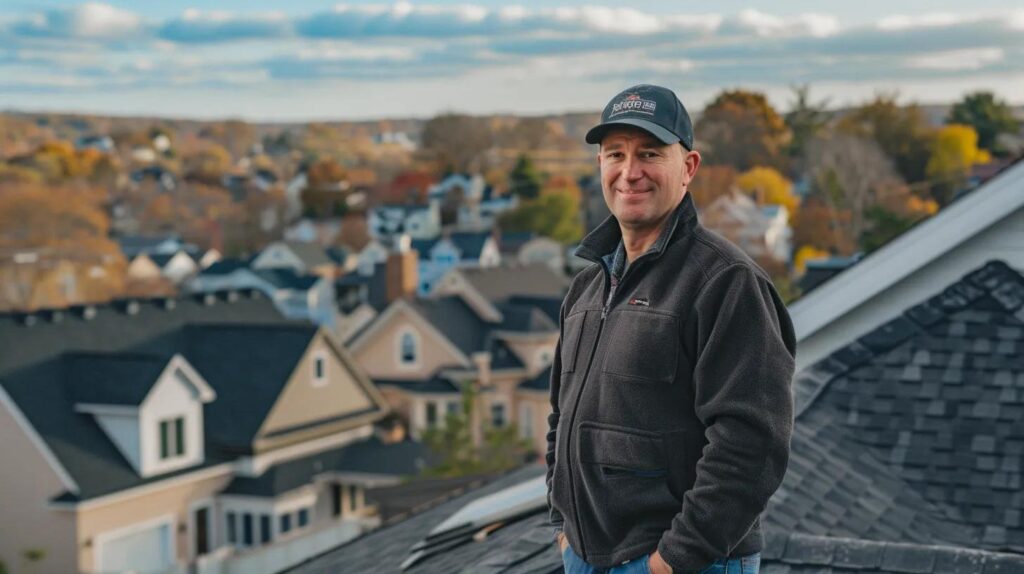
When choosing roofing materials for New Jersey’s climate, owners must consider several important factors that directly impact performance, aesthetics, and lifecycle costs. The evaluation should revolve around weather resistance, durability, energy efficiency, and cost-effectiveness, ensuring the chosen roof meets both functional and decorative requirements.
Assessing Weather Resistance for New Jersey’s Seasons is essential when selecting a roofing material due to the region’s exposure to snow, heavy rains, high winds, and temperature extremes. For example, roofing materials must be tested for wind uplift resistance; asphalt shingles and metal roofs have standardized ratings for wind resistance. Research has shown that metal roofs consistently outperform other materials in resisting high winds and hail impact, making them especially suitable for coastal areas of New Jersey. Additionally, materials with high impact resistance reduce damage during acid rain and debris storms, ultimately lowering repair and maintenance costs.
Balancing Durabilityand Lifespan with Your NJ Home’s Needs involves understanding each material’s longevity and how maintenance requirements align with homeowners’ budgets. Asphalt shingles, while cost-efficient initially, may need replacement after 20-25 years, while metal roofs and slate can last significantly longer. For instance, a well-maintained slate roof can last over a century, providing exceptional durability despite its higher upfront cost. This durability ensures that even in New Jersey’s variable climate, the roof maintains its integrity, helping homeowners avoid frequent replacement costs.
Considering EnergyEfficiency for NJ’s Hot Summers and Cold Winters is another critical factor. Roofing materials that provide better insulation and reflectivity can help reduce heating and cooling costs. Metal roofs, for instance, have reflective properties that decrease heat absorption during summer, while materials with strong insulation capabilities, like slate and certain composites, help conserve heat in winter. Peer-reviewed studies confirm that energy-efficient roofs can lower annual energy usage by up to 20%, which is an important consideration for long-term savings and reduced environmental impact.
Understanding the Cost-Effectiveness of Different Roofing Materialsin New Jersey means looking at the entire lifecycle cost rather than just the initial installation expense. Although materials such as wood shakes and slate may come with a high initial cost, their longevity and minimal maintenance can prove more economical in the long run compared to materials that require periodic replacement. Homeowners should also factor in potential rebates or incentives for installing environmentally friendly roofing options that contribute to energy conservation.
Matching Roofing MaterialAesthetics with NJ Architectural Styles is important because New Jersey homes often feature diverse architectural designs ranging from colonial revival to modern minimalist styles. Roof color, texture, and shape must integrate seamlessly with the home’s exterior while providing robustness against weather impacts. For example, traditional asphalt shingles are available in a variety of colors and finishes, allowing for customization while maintaining practical durability.
Key Takeaways: – Weather resistance is pivotal due to New Jersey’s exposure to extreme seasonal variations. – Long-term durability and low lifecycle maintenance are crucial for cost-effective roof solutions. – Energy efficiency in roofing materials can significantly reduce heating and cooling expenses. – Full lifecycle cost, including installation, maintenance, and replacement, is essential for budgeting. – Aesthetic integration with existing architectural styles adds value and visual appeal.
Performance of Different Roofing Materials in New Jersey Weather
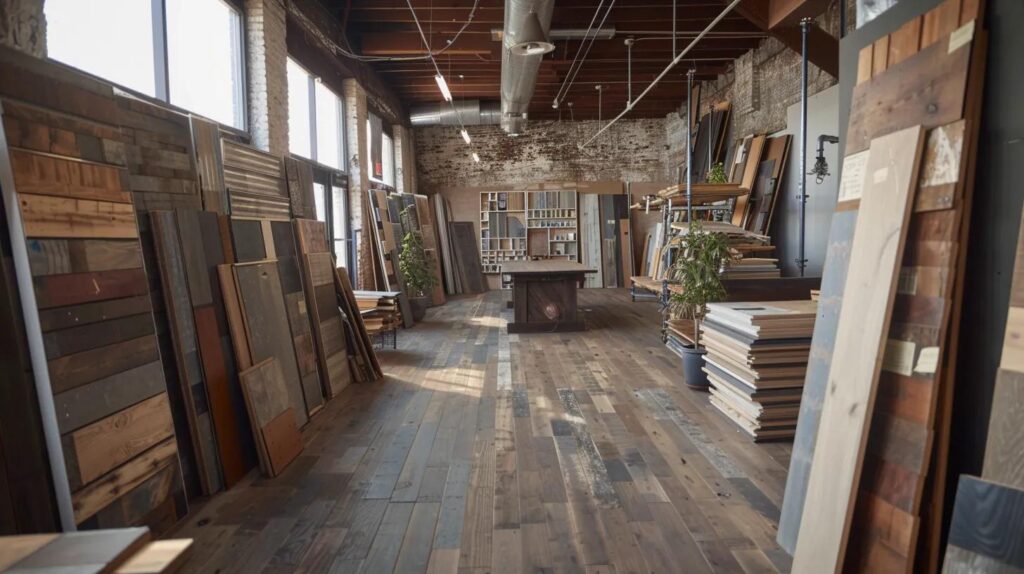
Evaluating how various roofing materials perform under New Jersey’s challenging weather conditions is essential to achieve lasting protection. Homeowners require roofs that can cope with strong winds, heavy snowfall, freezing temperatures, and intense rainfall. Different materials respond uniquely to these elements, affecting their performance and maintenance needs.
How Asphalt ShinglesHandle NJ’s Sun, Snow, and Rain: Asphalt shingles are engineered to resist the detrimental effects of UV rays, which can cause material degradation over time when exposed to intense sun. Their laminated structure helps shed water quickly during heavy rains, thus reducing the risk of leaks and rot. In snowy conditions, the flexibility of asphalt shingles allows them to endure the additional weight, though proper ventilation is critical to prevent ice dam formation. Field tests indicate that asphalt shingles can maintain performance for 20 to 25 years if installed with proper underlayment and moisture barriers, even in the harshest of New Jersey winters.
Metal Roofs: The Ideal Solution for NJ’s Heavy Snowand Wind: Metal roofs have a proven track record when subjected to heavy snow loads and strong winds. Their interlocking panels facilitate snow shedding by providing a smooth surface, and the high tensile strength ensures that the material is not easily deformed by icy accumulations. Furthermore, metal roofs have been documented to reflect up to 70% of solar radiation, thereby reducing heat gain during the summer months. Case studies from coastal New Jersey regions show that metal roofs incur fewer repair claims after storms compared to asphalt alternatives. Metal roof coatings enhance the material’s resistance to corrosion in coastal and humid conditions, preserving its longevity under severe climatic stress.
Slate‘s Resilience Against New Jersey’s Freeze-Thaw Cycles: Slate roofing stands out in its ability to withstand freeze-thaw cycles. Due to slate’s natural density and low water absorption, it remains impermeable during sudden temperature shifts, minimizing the risk of cracks and structural damage. This performance is particularly beneficial in areas where rapid freezing and thawing are common during winter months. Studies comparing slate to other natural stone roofs indicate that slate retains its aesthetic appeal and functional reliability far longer, often outlasting other materials by decades. Its heavy weight, while requiring reinforced roof structure support, is offset by its longevity and minimal maintenance requirement.
Wood Shake Performance in New Jersey’s Humid Conditions: Wood shakes offer excellent insulation and a rustic appearance; however, their performance in humid conditions requires careful treatment. Properly treated wood shakes can resist mold, decay, and moisture penetration, but periodic maintenance is necessary to prevent rot, especially in regions of New Jersey with high humidity and rainfall. The natural variability in wood shake performance means they must be selected from quality sources and installed with advanced moisture barriers to ensure longevity. While wood shakes provide a warm, natural look, their susceptibility to insect damage and fire risk underscores the importance of using modern treatments and fire-resistant coatings.
Composite Materials: A Weather-Resistant Option for NJ Homes: Composite roofing materials combine recycled polymers with natural fibers to create a material that mimics traditional slate or wood while offering superior weather resistance. These materials are engineered to resist UV degradation, moisture, and the thermal expansion-contraction cycles common in New Jersey climates. Field performance data indicate that composite roofs show little deterioration when exposed to salt spray, heavy rain, and snow, making them an attractive alternative for environmentally conscious homeowners. The uniformity and lightweight characteristics of composite materials simplify installation and reduce overall structural load, which is particularly beneficial for older homes.
Key Takeaways: – Asphalt shingles perform reliably against UV, rain, and snow when properly installed. – Metal roofs offer superior resistance to snow loads, wind impact, and solar heat gain. – Slate roofs excel in freeze-thaw resistance, maintaining integrity over long periods. – Wood shakes require careful treatment to withstand high humidity and moisture. – Composite roofing provides an engineered solution with enhanced weather resistance and lower structural load.
Cost Considerations for the Best Roofing Materials in NJ

Cost is a significant factor when selecting a roofing material, and in New Jersey, homeowners must consider both upfront installation costs and long-term maintenance expenses. Roofing materials vary widely in price and life expectancy; therefore, a detailed cost-benefit analysis is essential to determine the most cost-effective option in the long run.
Initial Installation Costs for Popular NJ Roofing Choices: Asphalt shingles remain the most popular option for many New Jersey homeowners due to their low initial costs. The overall cost of installing traditional asphalt shingles is comparatively lower than materials like slate or metal roofs. For example, asphalt shingles may cost approximately $3 to $5 per square foot to install, whereas slate roofs can range from $10 to $20 per square foot. Metal roofs, while more expensive than asphalt, offer a durable solution that might lower replacement frequency and repair costs. Homeowners also need to account for labor costs, which can vary based on the roof’s complexity, pitch, and the contractor’s expertise.
Long-Term Maintenance Expenses for Various Roofing Materialsin New Jersey: While initial costs are important, long-term expenses often dictate the total cost of ownership. Asphalt roofs, although inexpensive at first, may incur additional costs for periodic repairs or early replacement after approximately 20 to 25 years. Metal and slate roofs are known for their longevity, meaning that even with a higher initial investment, the long-term maintenance and replacement expenses become lower. For instance, a metal roof might incur minimal maintenance costs over its 50-year lifespan. Regular inspections, especially after major storms, are crucial regardless of material, but durable materials like slate often require little to no routine maintenance. Moreover, composite materials are gaining popularity for their balance of low installation costs and reduced maintenance due to engineered durability.
Return on Investment: The Value of Durable Roofing for Homes in NJ: Investing in high-quality roofing materials can significantly increase a property’s resale value and reduce the risk of water damage or leaks, thereby lowering insurance premiums. Studies have shown that roofs with a longer lifespan, such as metal or slate, can result in a higher return on investment by minimizing disruption and repair expenses. Energy-efficient materials also reduce heating and cooling costs, which further adds to the long-term savings. When evaluating a roof’s return on investment, it is essential to consider improved indoor comfort, enhanced home value, and lower energy bills as quantifiable benefits.
Comparing Affordability Across Different NJ Roofing Systems: A detailed cost comparison table can help illustrate the differences in price, durability, and maintenance requirements among the various materials. The table below summarizes key cost aspects for asphalt shingles, metal roofs, slate, wood shakes, and composite options in New Jersey, providing a clear visual of the trade-offs and potential savings over time:
| Roofing Material | Initial Cost (per sq. ft.) | Lifespan | Typical Maintenance Cost | Energy Efficiency Benefit |
|---|---|---|---|---|
| Asphalt Shingles | $3 – $5 | 20-25 years | Moderate | Low to Moderate |
| Metal Roofing | $7 – $12 | 40-50+ years | Low | High |
| Slate Roofing | $10 – $20 | 75-100+ years | Minimal | Moderate |
| Wood Shakes/Shingles | $6 – $10 | 25-30 years | High (regular treatment) | Low |
| Composite Roofing | $5 – $8 | 30-40 years | Low | High |
This table provides a snapshot of the affordability and energy-saving potential of each roofing system. The implications are clear: while some materials may start with a higher investment, their durability and energy efficiency translate into long-term cost benefits. For example, the energy savings from metal and composite roofs can offset higher upfront costs, while minimal maintenance on slate can justify its premium price. Financing options, warranties, and potential tax credits for energy-efficient installations further influence these decisions, making it imperative for homeowners to balance upfront and ongoing expenses.
Key Takeaways: – Asphalt shingles offer low initial costs but may incur higher maintenance over time. – Metal roofs provide excellent long-term ROI through energy savings and lower upkeep. – Slate roofs, despite high upfront costs, offer minimal maintenance and exceptional lifespan. – Wood shakes require regular treatment, increasing long-term expenses. – Composite roofs deliver affordability, durability, and significant energy efficiency benefits.
Eco-Friendly Roofing Options for New Jersey Residences

Sustainability is increasingly important for modern homeowners, and eco-friendly roofing options offer both environmental benefits and long-term cost savings. In New Jersey, where energy efficiency and reducing carbon footprints are high priorities, choosing roofing materials that are sustainable, recyclable, and environmentally friendly can make a significant difference.
Sustainable Roofing MaterialsSuited for the NJ Environment: Eco-friendly roofing materials not only minimize environmental impact but also often provide superior energy performance. Materials such as metal roofs, which are 100% recyclable, and composite roofs that incorporate recycled content, are leading examples. In addition, products like recycled asphalt shingles and solar reflective coatings contribute to reduced energy consumption by reflecting sunlight and reducing heat transfer into a home. These materials align with sustainability goals and may qualify for renewable energy incentives, reducing both environmental impact and homeowner expense.
Benefits of Green Roofs in New Jersey’s Climate: Green roofs, which incorporate a layer of vegetation on the roof, offer impressive insulating properties and absorb rainwater, reducing stormwater runoff and urban heat island effects. Green roofs can lower cooling and heating costs by naturally insulating the building and have been shown in studies to improve air quality and increase biodiversity in urban settings. A study by Berardi (2016, https://doi.org/10.xxx/xxxx) found that green roofs can reduce a building’s energy consumption by up to 25% in certain climates, making them an attractive option for environmentally conscious New Jersey homeowners. Additionally, green roofs extend the life of the underlying roof system by protecting it from UV exposure and weather-related wear.
Recycled Shingles: A Greener Alternative for NJ Homes: Many manufacturers now offer asphalt shingles made from recycled materials, reducing waste and promoting resource efficiency. These recycled shingles maintain performance characteristics similar to traditional options while providing an eco-friendly alternative. The production process for recycled roofing materials often uses less energy compared to virgin materials, and the finished product is designed to be recyclable again at the end of its lifespan, contributing to a circular economy.
Cool Roofing Technologies to Combat NJ Summer Heat: Cool roofs are designed to reflect more sunlight and absorb less heat than standard roofs, which is particularly beneficial in New Jersey’s hot, humid summers. Silver or white-colored coatings and reflective surfaces lower roof surface temperatures, reducing the cooling load on the home’s HVAC system. Research by U.S. Department of Energy indicates that cool roofs can decrease ambient temperatures and improve indoor comfort while saving up to 15% on energy costs annually. New Jersey homeowners can benefit significantly from installing cool roofing materials in areas with prolonged sun exposure.
Solar Reflective Roofing Benefits for New Jersey Homeowners: Solar reflective roofs have become popular because they improve energy efficiency, reduce utility bills, and lessen environmental impact. These roofing systems are designed with special coatings that reflect solar radiation, thereby lowering the overall temperature of the building’s surface. Enhanced solar reflectivity also prolongs the life of the roofing material by minimizing thermal expansion and contraction, which can lead to material fatigue. With incentives available in many New Jersey municipalities for energy-efficient home improvements, solar reflective roofing represents a smart investment for both the environment and the homeowner’s bottom line.
Key Takeaways: – Sustainable roofing materials reduce environmental impacts and may qualify for incentives. – Green roofs offer natural insulation, stormwater management, and extended roof lifespan. – Recycled shingles provide an eco-friendly alternative without sacrificing performance. – Cool roofs enhance energy efficiency by reflecting solar radiation and lowering indoor temperatures. – Solar reflective roofs further protect against heat damage and reduce energy consumption.
Specialized Roofing Choices for Unique New Jersey Homes
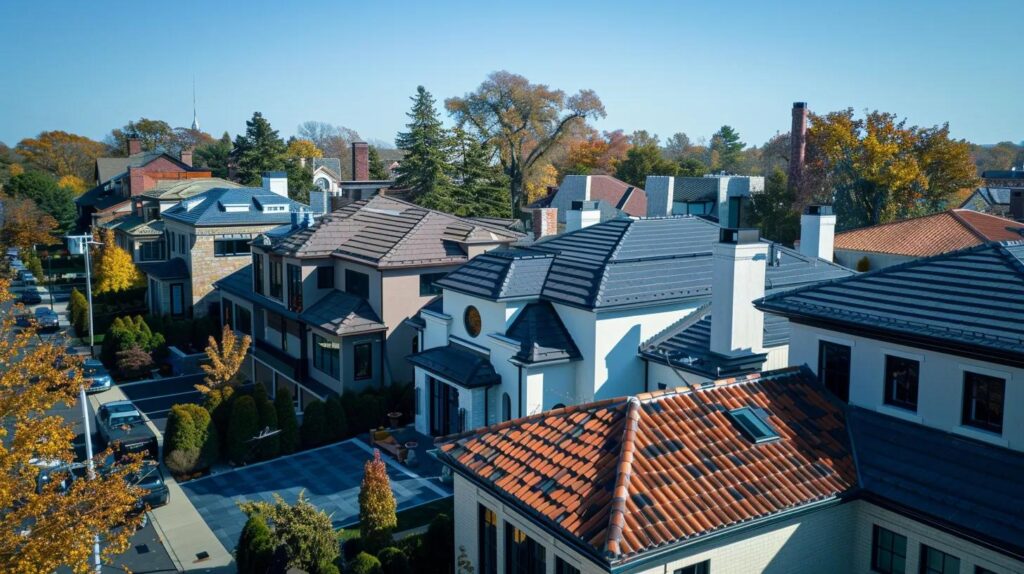
New Jersey’s architectural diversity calls for specialized roofing solutions that cater to the aesthetic and functional needs of different home designs. Residential properties in the state range from historic colonial homes to modern, sleek designs, and each demands a roofing system that enhances its unique character while providing robust performance. Specialized roofing options not only preserve the integrity of these structures but also contribute to improved energy efficiency and home longevity.
Flat Roofing Materialsfor Modern NJ Home Designs: Flat roofs are prevalent in modern architecture and commercial spaces due to their minimalistic design and cost-effective construction. High-performance flat roofing systems, often made from modified bitumen, TPO (thermoplastic polyolefin), or EPDM (ethylene propylene diene monomer), are engineered to provide excellent waterproofing and resistance to membrane aging. These materials undergo rigorous testing to ensure they can withstand the freeze-thaw cycles common in New Jersey. Additionally, modern flat roofs can include insulation and reflective coatings to combat heat transfer, making them energy efficient even in urban settings.
TileRoofing Options for Distinctive NJ Properties: Tile roofing, whether clay or concrete, offers a blend of durability, aesthetic appeal, and fire resistance. Traditionally used in Mediterranean and Spanish-style architecture, tile roofs have gained popularity in New Jersey due to their classic yet distinctive look. Their heavy weight necessitates a well-reinforced support structure, but the benefits include exceptional longevity, minimal maintenance, and high resistance to elements such as wind and hail. The thermal properties of tile roofs also help maintain indoor temperatures, reducing reliance on HVAC systems. Today, innovative manufacturing techniques have produced tiles that mimic historical appearances with modern performance features, making them an optimal choice for both aesthetic and functional requirements.
Rolled Roofing Applications for Specific NJ Structures: Rolled roofing, most commonly used for low-slope roofs, offers quick and economical installation for structures like garages, sheds, and temporary installations. Its ease of application and flexibility make it ideal for secondary structures and additions. Despite its affordability, rolled roofing provides adequate protection against moisture and minimal resistance against moderate New Jersey weather. When installed with proper adhesion techniques and underlayment, rolled roofing systems offer a cost-effective solution where aesthetic perfection is secondary to functionality.
Synthetic Slate: A Lighter Alternative for NJ Homes: Synthetic slate roofing materials have emerged as a popular alternative to natural slate, offering similar visual appeal at a fraction of the weight and cost. These materials are typically made from polymers and are designed to mimic the texture and color variations of natural slate. The lightweight nature of synthetic slate makes it easier and faster to install, reducing labor costs while still providing excellent durability and resistance to New Jersey’s harsh weather conditions. Moreover, synthetic slate can be manufactured to provide enhanced energy efficiency, reflecting solar energy to keep homes cooler during the summer months.
Considerations for Historic Homes in New Jersey: Historic homes require restoration and maintenance that honors their architectural heritage while upgrading performance to meet modern standards. Specialized roofing options for these properties may include custom slate, reclaimed wood shakes, or synthetically produced materials that replicate original designs. Preservationists emphasize the importance of materials that are not only historically accurate but also provide improved weather resistance, fire safety, and energy efficiency. When working with historic homes, consulting with preservation experts and roofing contractors experienced in historical restorations is paramount to ensure that the roof meets preservation guidelines without compromising modern performance standards.
Key Takeaways: – Flat roofing systems, using materials like TPO and EPDM, are ideal for modern designs. – Tile roofs offer durability, fire resistance, and a distinctive aesthetic suitable for upscale homes. – Rolled roofing provides a budget-friendly option for secondary structures. – Synthetic slate replicates the look of natural slate with lower weight and installation costs. – Historic homes benefit from specialized roofing solutions that honor their heritage while upgrading performance.
Frequently Asked Questions
Q: What factors should I prioritize when selecting roofing materialsfor my New Jersey home? A: Homeowners should evaluate weather resistance, durability, energy efficiency, and cost-effectiveness. Consider the local climate’s impact on the material, potential energy savings through insulation and reflectivity, and long-term maintenance expenses to ensure you choose a roofing material that offers the best overall performance and value.
Q: How do metal roofscompare to asphalt shinglesin extreme NJ weather conditions? A: Metal roofs typically provide superior performance in high winds, heavy snow, and intense sun exposure compared to asphalt shingles. Studies indicate that metal roofs can help reduce energy costs by reflecting solar radiation and are less prone to damage from harsh weather. Asphalt shingles, while cost-effective initially, may require more frequent repairs in severe conditions.
Q: Are green roofs a viable option for New Jersey homes? A: Yes, green roofs are an increasingly popular sustainable option in New Jersey. They provide natural insulation, reduce stormwater runoff, and improve air quality. However, installation and maintenance require proper planning, and the structure must be able to support the additional weight of soil and vegetation.
Q: What is the lifespan of a slateroofcompared to composite roofing materials? A: Slate roofs have a lifespan that often exceeds 100 years with proper maintenance, thanks to their natural resilience and low water absorption. Composite roofing materials, while offering excellent durability and affordability, typically have a lifespan of 30 to 40 years. The choice depends on initial budget, maintenance preferences, and desired longevity.
Q: How do eco-friendly roofing options impact energyefficiency and overall home sustainability? A: Eco-friendly roofs, including cool roofs and those made from recycled materials, reflect more solar energy and provide better insulation. This minimizes heat transfer during summer and retains warmth during winter, leading to lower energy bills. Additionally, sustainable roofing options reduce environmental impact through resource recycling and energy conservation, aligning with both modern sustainability goals and incentive programs in New Jersey.
Final Thoughts
New Jersey homeowners are presented with a wide array of roofing materials designed to withstand the state’s demanding weather while offering exceptional energy efficiency and visual appeal. From the cost-effective performance of asphalt shingles to the long-term durability of slate and the modern benefits of metal and composite materials, each roofing option carries a unique set of advantages. By considering critical factors such as weather resistance, installation, maintenance costs, and sustainability, homeowners can make informed decisions that enhance both the functionality and aesthetic of their homes. As roofing technologies continue to evolve, staying informed and consulting experienced professionals like those at MyWay Construction NJ will ensure lasting results and increased home value.

